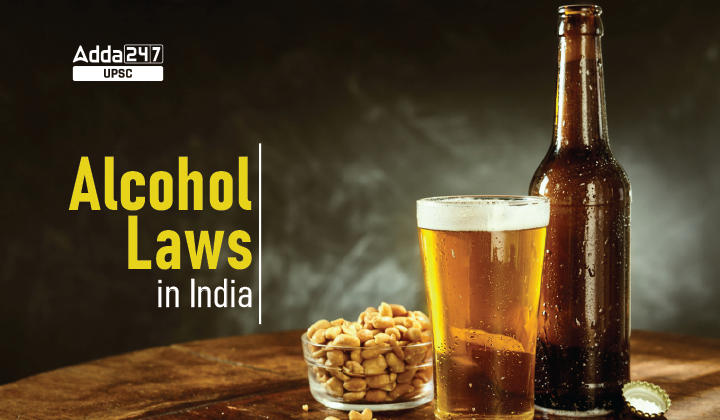Table of Contents
Alcohol laws in India- Relevance for UPSC
General Studies II- Health, Human Resource, Government Policies & Interventions.
Context
The most ambitious Delhi’s Alcohol Policy 2021-22 which brought in big discounts for consumers was scrapped amid allegations of corruption and irregularities in the drafting and implementation of the policy.
After scrapping the new policy, the Delhi government decided to bring back the ‘old excise regime’ that was in force before.
Alcohol laws in India: A background
- The legal drinking age in India and the laws which regulate the sale and consumption of alcohol vary significantly from state to state.
- In India, consumption of alcohol is prohibited in the states of Bihar, Gujarat, Nagaland and Mizoram.
- There is partial ban on alcohol in some districts of Manipur.
- All other Indian states permit alcohol consumption but fix a legal drinking age, which ranges at different ages per region.
- In some states the legal drinking age can be different for different types of alcoholic beverage.
Regulation
- Alcohol is a subject in the State List under the Seventh Schedule of the Constitution of India.
- Therefore, the laws governing alcohol vary from state to state.
- Liquor in India is generally sold at liquor stores, restaurants, hotels, bars, pubs, clubs and discos but not online.
- Some states, like Kerala and Tamil Nadu, prohibit private parties from owning liquor stores making the state government the sole retailer of alcohol in those states.
- In some states, liquor may be sold at groceries, departmental stores, banquet halls and/or farm houses.
- Some tourist areas have special laws allowing the sale of alcohol on beaches and houseboats.
Dry days
- Dry days are specific days when the sale of alcohol is not permitted.
- Most of the Indian states observe these days on major national festivals/occasions such as Republic Day (26 January), Independence Day (15 August) and Gandhi Jayanti (2 October).
- Dry days are also observed during elections in India.
Taxation on Alcohol
- Most states levy either Value added Tax (VAT) or Excise duty or both.
- Excise duty is a tax levied to discourage the consumption of a product.
- It is calculated on a per-unit basis. Meaning, if you buy 1 litre of liquor, you pay a fixed excise duty of Rs 15.
- Value-added Tax is charged in the proportion of the product. If a bottle costs Rs 100, and the state levies 10 percent VAT, the price rises to Rs 110.
Tax rates in States
- The 29 states/UTs in India approach liquor taxation differently.
- For instance, Gujarat has banned its citizens from consuming liquor since 1961.
- But outsiders with special licenses can still buy.
- Puducherry, on the other hand, earns most of its revenue from alcohol trading.
- Bihar has prohibited alcohol consumption entirely, meaning the state’s revenue from liquor consumption is nil.
- Its neighbor, Uttar Pradesh, earns the most excise duty on liquor.
- The state does not levy VAT but a special duty on liquor, collecting funds for particular purposes.




 TSPSC Group 1 Question Paper 2024, Downl...
TSPSC Group 1 Question Paper 2024, Downl...
 TSPSC Group 1 Answer key 2024 Out, Downl...
TSPSC Group 1 Answer key 2024 Out, Downl...
 UPSC Prelims 2024 Question Paper, Downlo...
UPSC Prelims 2024 Question Paper, Downlo...




